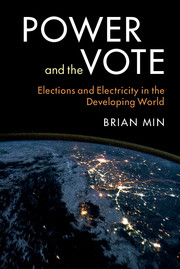Book contents
- Frontmatter
- Dedication
- Contents
- List of Figures
- List of Tables
- Acknowledgments
- 1 Introduction
- 2 Public Goods, Elections, and the Poor
- 3 Power and the State
- 4 Measuring Electricity from Space
- 5 Democracy and Light
- 6 Lighting the Poor
- 7 Electrifying India
- 8 Conclusion
- Appendix Satellite-Derived Estimates of Electrification
- References
- Index
5 - Democracy and Light
Published online by Cambridge University Press: 05 November 2015
- Frontmatter
- Dedication
- Contents
- List of Figures
- List of Tables
- Acknowledgments
- 1 Introduction
- 2 Public Goods, Elections, and the Poor
- 3 Power and the State
- 4 Measuring Electricity from Space
- 5 Democracy and Light
- 6 Lighting the Poor
- 7 Electrifying India
- 8 Conclusion
- Appendix Satellite-Derived Estimates of Electrification
- References
- Index
Summary
Introduction
For decades, political scientists have debated whether democracies are more likely than other regime types to provide valuable public goods to their citizens. Basic public goods such as clean water, sanitation, and electricity are critical because they are foundations for poverty alleviation and economic growth. Such public goods are often undersupplied by private markets, especially in the developing world, and governments must decide whether and how to address these market failures. Liberal theorists argue that free and open elections are the key to effective and responsive states. Elections create powerful incentives for politicians to pursue the preferences of the citizenry, despite the constraints that may otherwise exist within a country. Because voters have the ability to reward and punish the performance of their leaders, democratic politicians are more likely to channel a state's resources toward welfare-enhancing outcomes. Without elections, voters lack the ability to control and direct their politicians.
Yet, if democracies are supposed to be responsive to their citizens, why do so many more people in democratic India lack electricity compared to autocratic China? In an opinion piece in The New York Times, Amartya Sen laments, “The far greater gap between India and China is in the provision of essential public services... China has done far more than India to raise life expectancy, expand general education and secure health care for its people.” Across the world, more than half of the 1.3 billion people who lack electricity reside in democratic states. And within many developing democracies, glaring inequalities in public service provision challenge the norm of universalism, equality, and fairness many presume to be key features of democracy.
Using satellite imagery of the earth at night to develop new estimates of electricity access across every corner of the world, this chapter presents compelling evidence that democracies provide significantly broader levels of electricity to their citizens than do nondemocratic governments. This is not only because democratic leaders respond to citizens’ preferences for public goods: democracies have an added incentive to provide public goods because of the political externalities created by their creation and distribution. Although access to electricity is proclaimed to the masses as a pure public good with universal benefits, democratic politicians can capture additional electoral payoffs because of the discretion they exert over the delivery and implementation of electrification projects.
- Type
- Chapter
- Information
- Power and the VoteElections and Electricity in the Developing World, pp. 74 - 100Publisher: Cambridge University PressPrint publication year: 2015



